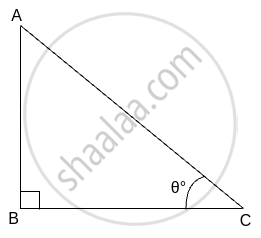Advertisements
Advertisements
Question
Prove that `(sinθ - cosθ + 1)/(sinθ + cosθ - 1) = 1/(secθ - tanθ)`
Solution
LHS = `((sinθ - cosθ + 1)/(sinθ + cosθ - 1)) xx ((sinθ + cosθ + 1)/(sinθ + cosθ + 1))`
LHS = `((sinθ + 1 - cosθ )/(sinθ + cosθ - 1)) xx ((sinθ + 1 + cosθ)/(sinθ + cosθ + 1))`
LHS = `((sinθ + 1)^2 - cos^2θ)/((sinθ + cosθ)^2 - 1^2)`
APPEARS IN
RELATED QUESTIONS
9 sec2 A − 9 tan2 A = ______.
Show that `sqrt((1+cosA)/(1-cosA)) = cosec A + cot A`
If `x/a=y/b = z/c` show that `x^3/a^3 + y^3/b^3 + z^3/c^3 = (3xyz)/(abc)`.
Prove the following trigonometric identities.
tan2θ cos2θ = 1 − cos2θ
Prove the following trigonometric identity:
`sqrt((1 + sin A)/(1 - sin A)) = sec A + tan A`
If cos θ + cos2 θ = 1, prove that sin12 θ + 3 sin10 θ + 3 sin8 θ + sin6 θ + 2 sin4 θ + 2 sin2 θ − 2 = 1
Given that:
(1 + cos α) (1 + cos β) (1 + cos γ) = (1 − cos α) (1 − cos α) (1 − cos β) (1 − cos γ)
Show that one of the values of each member of this equality is sin α sin β sin γ
Prove that:
`tanA/(1 - cotA) + cotA/(1 - tanA) = secA cosecA + 1`
Prove that
`cot^2A-cot^2B=(cos^2A-cos^2B)/(sin^2Asin^2B)=cosec^2A-cosec^2B`
`cosec theta (1+costheta)(cosectheta - cot theta )=1`
`(sectheta- tan theta)/(sec theta + tan theta) = ( cos ^2 theta)/( (1+ sin theta)^2)`
If `( cos theta + sin theta) = sqrt(2) sin theta , " prove that " ( sin theta - cos theta ) = sqrt(2) cos theta`
Write the value of`(tan^2 theta - sec^2 theta)/(cot^2 theta - cosec^2 theta)`
If `secθ = 25/7 ` then find tanθ.
What is the value of (1 + tan2 θ) (1 − sin θ) (1 + sin θ)?
If sin2 θ cos2 θ (1 + tan2 θ) (1 + cot2 θ) = λ, then find the value of λ.
\[\frac{1 - \sin \theta}{\cos \theta}\] is equal to
(cosec θ − sin θ) (sec θ − cos θ) (tan θ + cot θ) is equal to
If a cos θ + b sin θ = 4 and a sin θ − b sin θ = 3, then a2 + b2 =
9 sec2 A − 9 tan2 A is equal to
Prove the following identity :
`(cosA + sinA)^2 + (cosA - sinA)^2 = 2`
Prove the following identity :
`cosA/(1 - tanA) + sinA/(1 - cotA) = sinA + cosA`
Prove the following identity :
`(1 + cotA + tanA)(sinA - cosA) = secA/(cosec^2A) - (cosecA)/sec^2A`
If tanA + sinA = m and tanA - sinA = n , prove that (`m^2 - n^2)^2` = 16mn
Find the value of `θ(0^circ < θ < 90^circ)` if :
`tan35^circ cot(90^circ - θ) = 1`
Prove that `sin(90^circ - A).cos(90^circ - A) = tanA/(1 + tan^2A)`
Without using trigonometric identity , show that :
`sin42^circ sec48^circ + cos42^circ cosec48^circ = 2`
If x = a sec θ + b tan θ and y = a tan θ + b sec θ prove that x2 - y2 = a2 - b2.
Prove that: 2(sin6θ + cos6θ) - 3 ( sin4θ + cos4θ) + 1 = 0.
Prove the following identities.
sec4 θ (1 – sin4 θ) – 2 tan2 θ = 1
If x sin3 θ + y cos3 θ = sin θ cos θ and x sin θ = y cos θ, then prove that x2 + y2 = 1
Choose the correct alternative:
Which is not correct formula?
Prove that sec2θ + cosec2θ = sec2θ × cosec2θ
Prove that `costheta/(1 + sintheta) = (1 - sintheta)/(costheta)`
If cos A + cos2A = 1, then sin2A + sin4 A = ?
If tan θ – sin2θ = cos2θ, then show that sin2 θ = `1/2`.
Prove the following identity:
(sin2θ – 1)(tan2θ + 1) + 1 = 0
Find the value of sin2θ + cos2θ

Solution:
In Δ ABC, ∠ABC = 90°, ∠C = θ°
AB2 + BC2 = `square` .....(Pythagoras theorem)
Divide both sides by AC2
`"AB"^2/"AC"^2 + "BC"^2/"AC"^2 = "AC"^2/"AC"^2`
∴ `("AB"^2/"AC"^2) + ("BC"^2/"AC"^2) = 1`
But `"AB"/"AC" = square and "BC"/"AC" = square`
∴ `sin^2 theta + cos^2 theta = square`
Factorize: sin3θ + cos3θ
Hence, prove the following identity:
`(sin^3θ + cos^3θ)/(sin θ + cos θ) + sin θ cos θ = 1`
